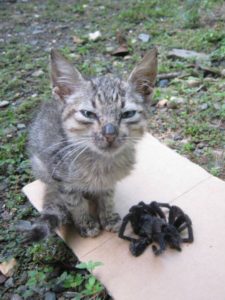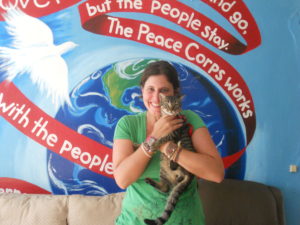“He’s my little hero.”
That’s how Erin Hicks describes her best feline friend, Tico Junior. Like his dad, Tico Senior, both cats were born in the Dominican Republic while Hicks served in the Peace Corps. Both offered her protection, but in different ways.
“Tico Senior saved me from tarantulas, insects, and rats while I was living in the Dominican Republic,” said Hicks.

Unfortunately, Tico Senior died shortly after Tico Junior was born, but the son picked up where the father left off serving as Hicks’ “little shadow” and savior.
At just seven months old, Tico Junior moved with Hicks to California. Soon after, they headed to Colorado so that she could attend graduate school at Colorado State University. During their time in Colorado, Tico Junior has saved Hicks on a variety of occasions, including the night he awakened Hicks to alert her to smoke filling their home after a roommate left dinner in the oven and fell asleep. On another occasion, Tico Junior shredded the air mattress of a house guest who had overstayed their welcome by several months.
“He had never destroyed anything before that air mattress – I think he just knew that I needed help,” said Hicks.
During the isolation of COVID-19, Tico Junior and his need for multiple daily kitty walks helped Hicks through difficult days.

Even Heroes Need Help
Earlier this year, on a visit to California to see her parents, Hicks knew something was wrong with Tico Junior. He was diagnosed with Inflammatory Bowel Disease (IBD) when he was three years old but was vomiting more frequently than usual, and the standard remedies weren’t helping.
“I brought him to a cat specialty clinic in California where they recommended Tico Junior have an endoscopy, but the $3-5,000 cost was really a stretch for me financially,” said Hicks. “One of the vets at the clinic, who was a CSU grad and knew I lived in Colorado, suggested I check in with them.”
After calling the James L Voss Veterinary Teaching Hospital, Hicks connected with Dr. Craig Webb, professor of Small Animal Internal Medicine, who studies IBD and GI Lymphoma in cats.
Following an endoscopy with Webb, Tico Junior was diagnosed with small cell lymphoma.
“It wasn’t the news I wanted to hear, especially since my dad has been in and out of remission with lymphoma for years,” said Hicks.
Webb offered Hicks the option to enroll Tico Junior in a clinical trial at the Flint Animal Cancer Center designed to understand how a cat’s body absorbs and metabolizes chlorambucil, a commonly used oral cancer drug for cats.
“After talking to the clinical trials team, I decided this was the way to go,” said Hicks. “Even if it didn’t help Tico Junior, it might help future patients.”
Treatment with chlorambucil is considered the standard for cats with small cell lymphoma. The goal of treatment is to decrease and ideally resolve the symptoms of the disease, such as vomiting, diarrhea, and weight loss. But, frustratingly, sometimes the chlorambucil itself can cause those same signs, and it can be challenging for veterinarians to sort out whether it is the treatment or the disease that is the issue.
“The goal of our study is to understand how the drug is metabolized in cats and look for clues as to why some cats may experience side effects of the medication while the majority of kitties do not,” said Dr. Jenna Burton, Flint Animal Cancer Center medical oncologist.
As part of the 14-day study, Tico Junior completed lab work, including a complete blood count and chemistry profile, and then received his first dose of chlorambucil.
Unfortunately, Tico Junior was one of the felines who did not tolerate the chemotherapy resulting in inappetence and vomiting.
“We’re all disappointed that Tico Junior had side effects from the treatment, but we’re also so grateful to Erin for participating,” said Burton. “We hope that the information we learn from Tico Junior’s blood work will help us understand why he didn’t tolerate the chlorambucil and lead to clues that will improve treatments for future patients. He’s really helping us learn.”
“I feel good to have been a part of this study,” said Hicks. “And I’m sure Tico Junior is more than happy to help. That’s just who he is, a little hero.”
Gifts to One Cure support our clinical trials program and comparative oncology research. Give today to support better treatments for pets and people with cancer.